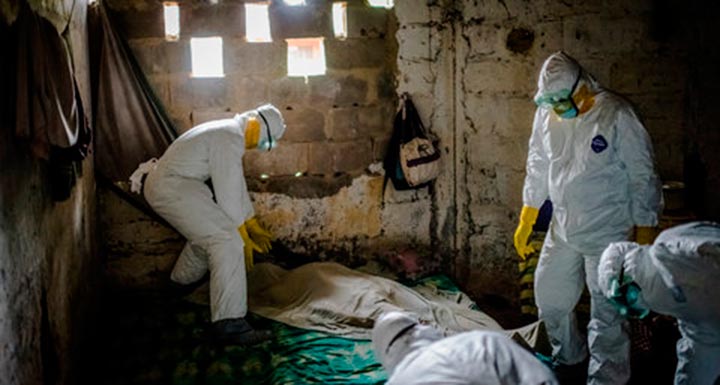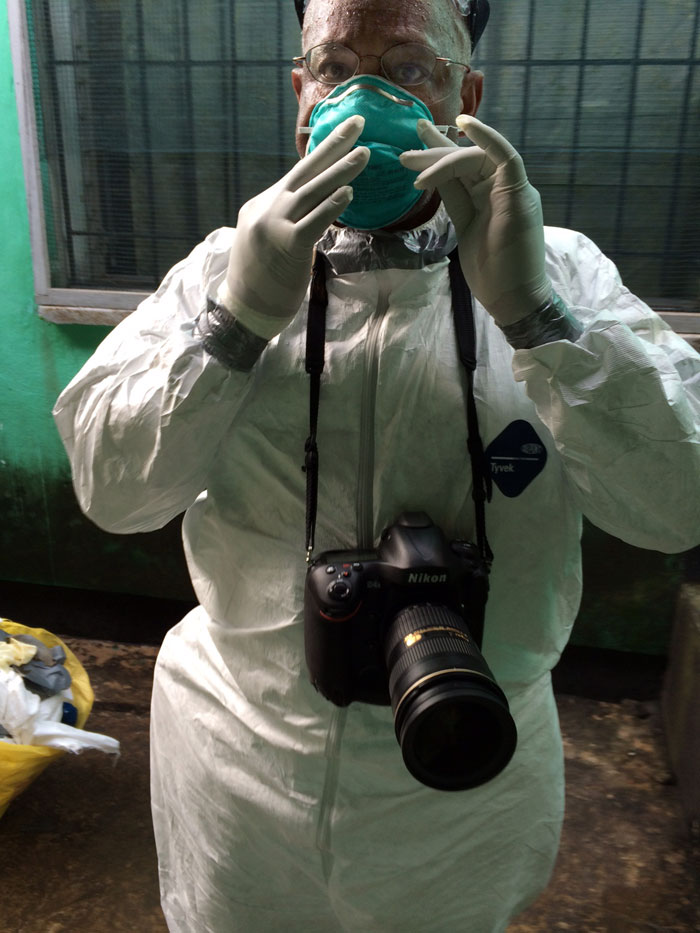
Syracuse disinvites washpost pulitzer photographer due to ebola fears
SYRACUSE, NY (October 16, 2014) – Three-time Pulitzer Prize-winning photojournalist Michel du Cille of The Washington Post, who returned from covering the Ebola crisis in Liberia 21 days ago and who is symptom free, was asked by Syracuse University officials today not to come to campus where he was scheduled to participate in a journalism program.
“I just got off the phone with the Dean [Lorraine Branham], and I am pissed off,” du Cille told News Photographer magazine this afternoon. “I am disappointed in the level of journalism at Syracuse, and I am angry that they missed a great teaching opportunity. Instead they have decided to jump in with the mass hysteria.”

Du Cille was scheduled to be one of the visiting professionals who take part in portfolio reviews and critique sessions with students the S.I. Newhouse School of Public Communications “Fall Workshop.” Fall Workshop director and Newhouse associate professor Bruce Strong today confirmed to News Photographer this afternoon that du Cille as well as his Washington Post photojournalist wife Nikki Kahn had indeed been uninvited. Kahn, who won a Pulitzer Prize in 2011 for Breaking News for the Post’s coverage of Haiti, was to be a student coach on Team 9. Du Cille was to be a coach on Team 7.
“It was really out of our hands,” Strong said. “The decision came from the Provost of the university [Eric F. Spina].” There was a meeting today that involved, at the least, Spina (who is also the university’s Vice Chancellor) and Branham. After that meeting, Branham called du Cille with the news.
Since his return from Liberia, Du Cille has been following CDC guidelines and monitoring himself closely for symptoms. He has been taking his temperature at least twice a day (but actually more like on the hour, every hour) for the past 21 days.
Just yesterday, du Cille spent all day with Centers for Disease Control director Dr. Thomas Frieden at CDC headquarters in Atlanta, GA.
And this afternoon du Cille just finished photographing Dr. Frieden on Capitol Hill where he testified before a Congressional Hearing on the Ebola crisis.
“If she [Branham] had bothered to discuss it with me, she would have known,” du Cille said. “But they’re just not going to take the direct word of the CDC and the director, and 21 days of monitoring means nothing to them because they’re just being alarmed.”
Du Cille said he asked the CDC’s Communications Director Tom Skinner on Tuesday in Atlanta what the CDC did with their scientists and workers when they return to Atlanta from working in Africa with Ebola patients.
“He told me that the CDC has them monitor their temperature twice a day, watch for symptoms, and to be alert for 21 days. They don’t ask them to stay away, they don’t quarantine them, nothing like that. They said that if you’re not going to show symptoms between Day 2 and Day 21, then you’re not going to get Ebola.”
At the CDC the Washington Post photojournalist also asked one of Dr. Frieden’s physicians, Dr. John Brooks, about the possibility of whether or not he could still be an Ebola carrier if he’s gone this long without showing any symptoms. The accepted incubation period for Ebola is 21 days. While du Cille had been around many bodies of people who died because of Ebola, he says he has no reason to believe that he had actually been exposed to the virus. (See du Cille’s “Inside An Ebola Hospital“)
“Dr. Brooks told me, and I quote, that since my 21 days are up it is very, very unlikely that anyone could get Ebola from me.”
Du Cille’s said that his biggest disappointment isn’t that he now won’t be working with Syracuse students. His greatest disappointment, he said, is that the school’s journalism reputation is now tarnished in his mind.
“They missed a great teaching opportunity here for the students, to show them how to report the facts and practice good journalism,” du Cille said. “Instead they went the alarmist route.”
Strong told News Photographer that it is his hope that the school will invite du Cille to come to campus for a program sometime in the future.
“I don’t know if that’s something that will interest Michel or not,” Strong said, “but I hope he would still be interested.”
Tonight Dean Lorraine Branham explained today’s decision.
“He was disinvited because of concerns that were generated by some students that led me to believe that it would lead to even more concerns,” Lorraine Branham said by telephone tonight. “So it was in the best interest of the students for me to withdraw the invitation.”
Branham said she didn’t know that du Cille had been working in Liberia until just this morning, when a student raised concerns to her about how long du Cille has been back in the States. The student, she said, was concerned – and she knew that du Cille’s participation was likely to lead to even more concerns from other students as well as parents.
“This morning I learned that he had been at the CDC, I learned that he had been back 21 days, and I learned that he had been traveling with the [CDC] director, so yes, I knew,” Branham told News Photographer magazine tonight.
“But even knowing that, it’s my responsibility to protect the students. Twenty-one days is the CDC’s standard, but there have been questions raised about whether the incubation period is longer. I knew that parents would be upset. And at the end of the day my concern is about the students.”
Branham said she told du Cille today that she would still like for him to come to Syracuse at some point in the future to lead students in a conversation about the “irrational fears and making bad decisions,” such as some of those surrounding the Ebola crisis. “And I know Michel considers my decision a bad decision. But we can have that discussion in the future with a larger group of students from the entire university, not just a smaller group at the workshop.”
Du Cille has won three Pulitzer Prizes for his journalism. His first Pulitzer was shared with fellow Miami Herald staff photographer Carol Guzy for their coverage of the November 1985 eruption of Colombia’s Nevado del Ruiz volcano. He won the 1988 Pulitzer Prize for Feature Photography for a photography essay on crack cocaine addicts in a Miami housing project. In 2008 he shared the Pulitzer Prize for Public Service with Washington Post journalist Dana Priest and Anne Hull for their investigation exposing the mistreatment of wounded soldiers and veterans at Walter Reed Hospital in Washington, DC.
A somewhat similar concern arose Thursday at the University of Georgia in Athens, GA, when Liberian journalist Wade C.L. Williams was scheduled to discuss her front line encounters covering the Ebola virus. But after the press release for the event – sponsored by the school’s Henry W. Grady College of Journalism and Mass Communication – went public, there were complaints and concerns voiced by students’ parents and members of the community. The event with Williams was “postponed,” and the Liberian was replaced by a reporter from The Washington Post, Todd C. Frankel. [Link to cached page].
However, the big difference between what happened at Syracuse and at the University of Georgia is that while du Cille had been back in the States for 21 days, Williams would have been traveling directly from Monrovia to Athens, GA, this week.
“We were not dealing with the 21-day window,” Charles N. Davis said today. He is the Dean of the Grady journalism college. “We called Wade and she was disappointed … but greatly understanding. We will have her here after the crisis is over. We are deeply dedicated and committed to learn from her perspective.”
UGA’s press release announcing the event with Frankel was quick to point out that Frankel “returned to the U.S. September 1” after ten days in Sierra Leone (in other words, long past the 21 day incubation period for the Ebola virus).
From the: NPPA

